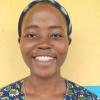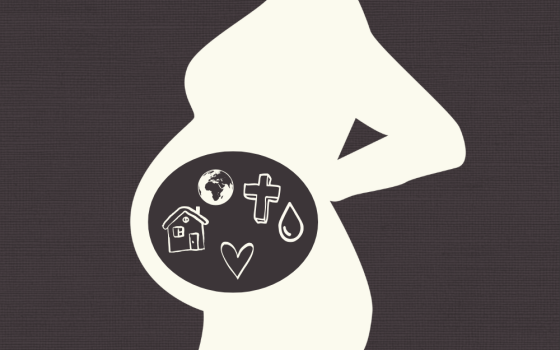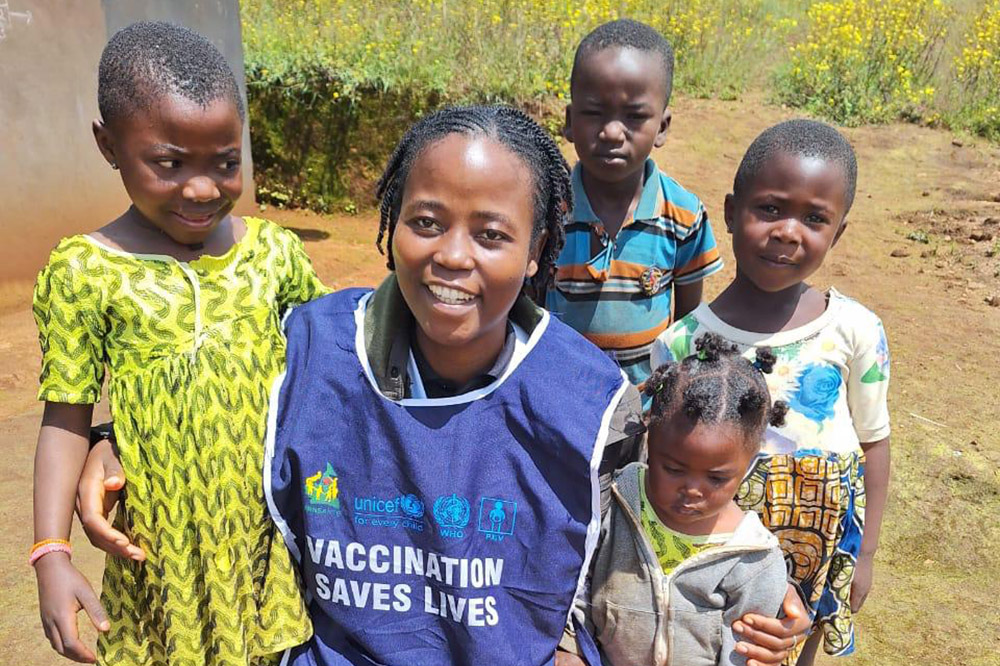
Sr. Veronica Nange Ngeh and her team carried out a vaccination outreach in the neighboring village of Mbih, Cameroon. (Courtesy of Veronica Nange Ngeh)
I first came to know the Missionary Sisters of the Immaculate Heart of Mary in Nkambe, Cameroon, where I grew up. As a child, I dreamed of becoming a sister, though the desire faded after secondary school. Years later, while studying midwifery at university, the call returned.
During a vocation camp in Bamenda, I met a Missionary Sisters of the Immaculate Heart of Mary sister. Many congregations were present, yet I felt attracted to the congregation — first by their simple, unique dress, and then by their charism, spirituality, apostolates and touching photos of sisters in mission. They seemed like an answer to what I had been searching for. In September 2017, I joined the sisters as an internal aspirant in Ngoya-Yaounde.
Now, after seven years in the congregation, I serve in Christ the King Parish in Nkambe, in Cameroon's northwest region.
Advertisement
Charism and mission
Our charism is "passion for God and passion for humanity." We live this by serving wherever human life and dignity can be enhanced: in schools, hospitals, justice and peace organizations and outreach to street children.
Nkambe, the headquarters of Donga Mantung division, lies on the farthest edge of the Bamenda Grassfields. Its people are called the Wimbums, and their vernacular is Libum. Most are farmers, cultivating maize, beans, Irish potatoes, cocoyams, huckleberry and other vegetables.
In 2011, Nkambe's population was estimated at 170,000. Most are Christians, with Presbyterians being the largest group, followed by Baptists and Catholics. A small number of Fulani people also live in the district, grazing cattle on the grasslands.
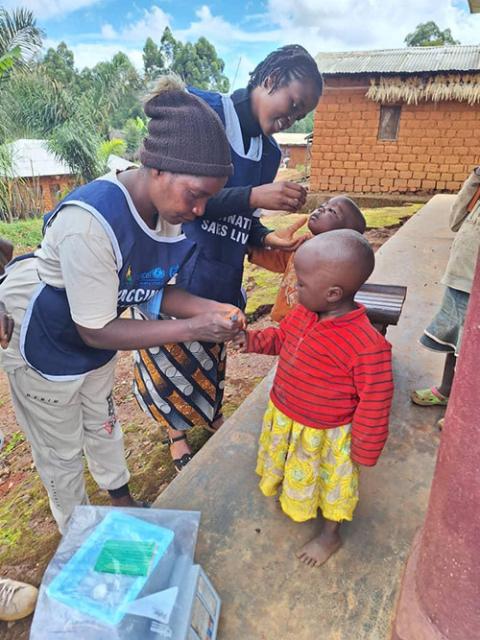
Sr. Veronica Nange Ngeh and her assistant conduct a polio campaign outreach in a neighboring village in a remote area of northwest Cameroon. (Courtesy of Veronica Nange Ngeh)
Health centers in Nkambe
The Missionary Sisters of the Immaculate Heart of Mary sisters run three health centers entrusted to us by Bishop George Nkuo of the Diocese of Kumbo: St. Patrick's Catholic Health Center in Binshua, St. Martin's Integrated Health Center in Moh, and St. Mary's Zone Post in Akweto.
These facilities were established to meet urgent community needs, including poor access to health care, lack of potable water, bad roads and no electricity. Before the centers were built, villagers had to travel long distances to Nkambe for treatment — about 6 kilometers from Moh, 5 kilometers from Binshua and 10 kilometers from Akweto. Hence the bishop of the diocese, in collaboration with the respective village representatives and other members, thought it wise to create health centers in order to shorten the distances the people had to travel.
Today, I serve as chief of center in Binshua and administer all three health centers. I divide my schedule between them: three days a week in Binshua, about 5 kilometers from Nkambe where I live; two days a week in Moh, nearly 6 kilometers away; and twice a month in Akweto, about 10 kilometers from town. I usually make these trips by motorcycle, the most common form of transport, though the rough roads become especially difficult during the rainy season. When conditions are too dangerous, I sometimes make the journeys on foot.
In Binshua, we provide antenatal and postnatal care, infant welfare, consultations, admissions, lab tests, deliveries, HIV services and a pharmacy. We also run a small canteen so patients can access food while at the center. The staff includes five nurses, a cleaner and a night watchman. In Moh, we offer the same services, though the facility is smaller, with three nurses and one cleaner. The health center in Akweto operates under Moh. For now, we are renting space while working toward construction, but the services there mirror those in Binshua and Moh.
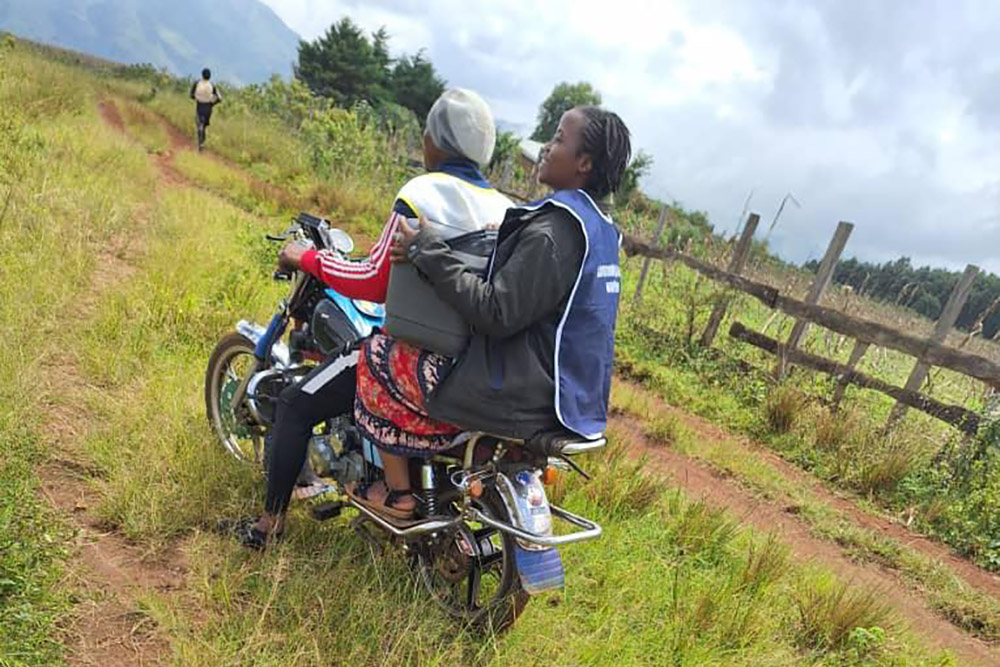
Because the roads are in poor condition or nearly nonexistent, Sr. Veronica Nange Ngeh and local residents in Cameroon primarily use motorbikes for transportation. She rode 25 kilometers to administer vaccinations to children in a remote area. (Courtesy of Veronica Nange Ngeh)
The difficulties we face in these three health facilities include water shortages during the dry season, no electricity to light the centers at night, deteriorating structures that affect patients' well-being, and a lack of adequate equipment — especially in Akweto. Poor roads make travel difficult and exhausting, and the absence of reliable transportation further complicates movement between centers.
Yet, despite these hardships, we serve all those who come to our facilities with joy, knowing our reward comes from God. We are especially grateful for our staff, who remain committed even though many people today do not want to work in villages. Every two months, workers from the three centers gather for a social day to rest, build community, get to know each other and relax.
Apart from my ministry in the health centers, I also serve in pastoral work and at the parish level I work with the vocations group. Occasionally, I accompany the priest to outstations for Mass.
Whether at the health centers or in parish life, I strive to keep my joy notwithstanding the difficulties. I believe a good missionary is one who smiles even when the path is tough.
